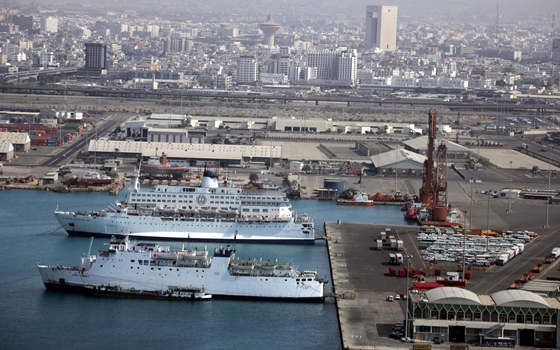The Jeddah Islamic Port is set to hold the top position in Saudi Arabia's maritime sector in terms of both total tonnage and container throughput in 2013 after demonstrating strong growth in 2012, Business Monitor International said in its "Saudi Arabia Shipping Report Q2 2013".
The government stimulus package continues to make itself felt through increased consumer confidence, which is driving up container volumes at the Kingdom's ports. Total tonnage volumes are also undergoing strong growth, and will be supported over the medium term by a massive house-building program that is getting underway.
The Kingdom is well supported by a growing fleet of dry and liquid bulk tankers which continues to expand.
Two of the country's largest crude oil tanker operators are in the final stages of their merger, which results in the creation of the world's fourth-largest operator in this segment.
Jeddah Islamic Port's tonnage throughput is forecast to grow 8.8 percent, and to average 7.9 percent to 2017. Its throughput is forecast to grow 7.7 percent, and to average 7.7 percent over our forecast period.
Total trade real growth is forecast at 1.5 percent, averaging 1.4 percent to 2017.
With the Ramadan-induced congestion at the Saudi Arabian port of Dammam having eased, container-shipping companies began returning to the port in January, having been forced to reroute through Bahrain in the intervening period.
This will have caused dismay to the Khalifa bin Salman Port (KBSP) in Bahrain, which had benefitted as a result of the disruption.
The National Shipping Company of Saudi Arabia (Bahri) registered a 75.1 percent year-on-year (y-o-y) increase in net profit to SR504 million ($134.37 million) in 2012, compared with SR287.8 million ($76.73 million) in 2011.
The rise in net profit was attributed to an improvement in the oil and gas sector and the general cargo sector. The start of operations by Bahri's Bahri Dry Bulk Company along with an increase in profit from Bahri's portion from Petredec also contributed to the rise in net profit.
Moreover, Danish ocean carrier Maersk Line has responded to the 15 percent y-o-y growth in Saudi Arabia's exports and imports by planning 750 calls at the country's ports in 2013, against just 450 in 2010. The firm's ships achieved a more-than-90 percent rate for ontime arrivals and departures when Saudi ports were heavily congested.
However, a major risk to otherwise positive outlook would come from a sharper-than-expected downturn in the global economy, the report noted. "If it was to translate into a substantial decline in oil prices, it would hit our macroeconomic forecasts for Saudi Arabia," the report added.
The Saudi Gazette
8 June






















































